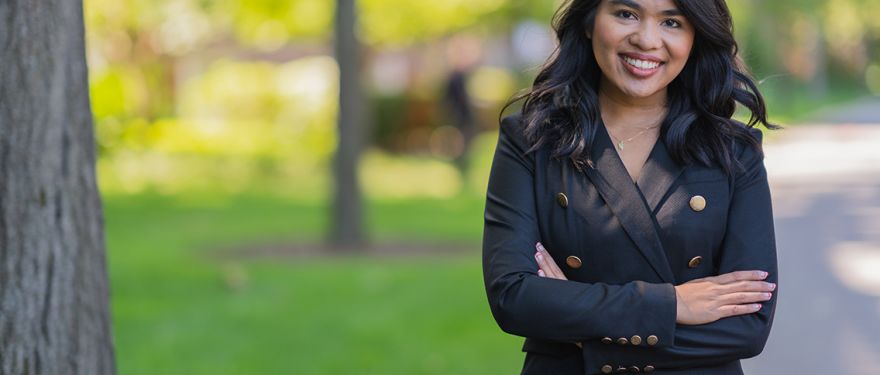Farah Azmi is a rising EC student at HBS and proud member of Section B. Farah spent her undergrad at University of Utah, majoring in finance. She worked at Barclays in investment banking and after at Tommy Hilfiger in corporate strategy. At HBS, Farah is a member of the Women’s Student Association, Retail & Luxury Goods Club, Entrepreneurship Club, and the iLab’s Venture Incubation Program. Farah attended HBS for their entrepreneurship programs at the Rock Center and at the Innovation Lab where she hopes to launch her apparel brand, IXORA Apparel. Building a DTC Brand through COVID is a blog series in which she details her trials and tribulations through starting a company. Today, she shares a special version for HBS.
As my fellow HBS classmates flew off to their hometowns for their remote internships, I thought about their jobs and financial security and wondered if I made the right decision to start my own company with HBS’s Rock Summer Fellowship. Sometimes I wonder why they accepted me and let me start my own apparel company amidst a pandemic. Yes, an apparel company. An apparel company is already risky to start in a non-COVID world much less during a pandemic when no one is buying clothes - I didn’t need an HBS education to teach me that. Despite all the questioning and concerned are-you-sure-you-want-to-do-this looks from family, I took the plunge into the unknown world of entrepreneurship.
My Vision
When I was in investment banking, I desperately sought quality workwear that didn’t make me feel and look older and frumpy. Why can’t there be a one-stop shop of apparel that is both work-friendly and date-friendly plus fits me without taking it to a tailor? Thus, IXORA Apparel was born. My vision is to make a product tailored just-for-her in styles that would make her feel confident in whatever the setting.
The Work
In order to deliver perfect fits, I wanted to do made-to-measure apparel to change the view from mass-made apparel to apparel that is investible yet accessible. As I spent countless hours googling permutations of “made-to-measure factories,” my search results came up short. I wondered who else I would ask for manufacturing help and soon enough I realized I had a manufacturing expert at my hands, my TOM (Technology and Operations) Professor Willy Shih. I emailed Professor Shih asking for a meeting and he scheduled me in within the week. As I rambled on about my grand plans, I looked into the Zoom screen and worried that this was yet another dead end or that his strengths weren’t in apparel manufacturing and he would just point me to Google. As I stopped talking, he said, “You know… I went to this factory in China….” And the rest is history. I finally have a manufacturer.

As you can imagine, finding a manufacturer was only one step among thousands – I had to figure out a marketing strategy, finalize sketches with my designer, decide if I wantedto incorporate and more. Prior to school, I had a career in investment banking covering apparel companies and was in corporate strategy at a large apparel company, but nothing can really prep you for entrepreneurship. I knew what to do, but not necessarily how to do it. At HBS, we are put in the protagonist’s shoes every day and are forced to evaluate what decision he or she should make. While my 94 section mates and I always walked into discussions with firm conclusions in mind, the decisions are far more difficult when you’re the protagonist in your own case study. I’m constantly asking myself: “Should I be really doing this?” “But what if I did this instead?”
Putting the case-method to use, I asked my section mates to put themselves in my shoes and use my problems as their case studies. Maybe the decision would be clearer to them. For marketing strategy, I brainstormed with my section mate Dana who was the marketing queen in class and knew frameworks like the back of her hand. She gave me ideas for partnerships and even gave me the idea to start this blog series about building a company through COVID on my website. For incorporating decisions, I had 5 other entrepreneurs from my section eager to give me advice from their experiences. My section mates were the ones who encouraged me to apply to Harvard’s Innovation Lab’s Venture Incubation Program; upon acceptance, I’ve been able to attend numerous workshops from building pitch decks to developing your brand story. For every problem I had, someone was always willing to lend an opinion.
My Reflections
Typically, in my blog series, I discuss the differences in building a company in the COVID world vs. the non-COVID world followed by some takeaways. In both worlds, I’m fortunate enough to have my HBS community. However, the slight difference is that in a COVID world, life has been hard for everyone. The community of HBS is experiencing pain in different ways. We’re all suffering the loss of an in-person experience in our classes, maybe our dream internships that were cancelled, or lack ofsocial activities. However, despite us all being in a tough position, we’re all willing to help each other more because of it.
I didn’t understand what the HBS community meant before I attended school but being a part of it has truly shown me the power of this community. When I feel like I’m drowning in decision-making, my classmates and professors lend an arm to pull me back on the boat. Initially, I feared that being the sole founder of IXORA Apparel would be lonely, but I’ve learned that I have my HBS family along for the ride with me.

